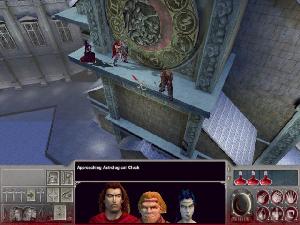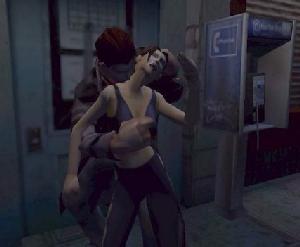Where’s Tom Cruise?
The vampire Lestat was one evil mother in Interview With the Vampire.
He murdered, cajoled, corrupted, and made it all look good. In the follow up,
The Vampire Lestat, Lestat plays the misunderstood hero who actually
always sought to do good, which you would understand if you had all of the omitted
information.
You probably noticed that they never made a movie out of The Vampire Lestat.
In the words of a famous Bullfrog marketing campaign, “It is good… to be bad.”
Not that it’s the only problem, but Nihilistic software, developers of Vampire
– The Masquerade: Redemption, should have listened.
Vampire is based on the Vampire – The Masquerade role playing
game system by White Wolf Game Studios. The computer game simplifies the elaborate
role playing system into a pseudo Diablo-clone set
on extreme plot autopilot with a few bugs lurking on the circuit boards. Vampire
features brilliant graphics, simple control, and unfortunately a bevy of single-player
problems and poor design choices that take it from being possibly one of the
most interesting games of the year to one of the most aggravating and disappointing.
But when it works, it works well, so you’ll likely be drawn along the frustrating
ride to it’s completion, kicking and spitting every inch of the way.
The story follows the character of Christof, a Crusader who find himself on the other side of holiness after an injury, perpetrating undead slaughter, falling for a nun (classic!), and finally getting his large neck bitten by an ancient lady of questionable dental and dermatological hygiene. The game stretches through two time periods (12th century and 1999) and four cities (Prague and Vienna for 12th Century, London and New York for 1999).
Through it all there is much combat and little character development, some
lengthy speeches and a lot of bemoaning damnation. Christof just can’t handle
his new unholy self, and spends the entire time trying to get back to being
human. To this end there is a great emphasis on doing good, saving those whose
blood you sucked, and, uh, saving the world. In the words of Dr. Evil, "…you’re
quasi-evil, you’re semi-evil, you’re the margarine of evil, you’re the Diet
Coke of evil – just one calorie… not evil enough!"
While goodness is preternaturally annoying, controlling Christof and his compatriots
is just downright nostril-hair-pulling lousy. You view all the action from a
third-person mouse controlled camera. Almost every function of the game is performed
with a simple click. That approach necessitates good AI to do the legwork, but
sadly the AI in Vampire is not up to the task. There are path finding,
combat tactics, and combat dynamics problems that make it difficult to move
or fight. Your compatriots also aren’t very good at staying alive, or un-alive,
or Dead-Alive, or whatever.
The interface is limited as well in that you cannot pause to issue orders
(like in Baldur’s Gate), set difficulty (it’s
really, really hard), or save anywhere you like.
There are also a few problems with weapon implementation in the game. Though the game system works well with melee weapons, gun implementation in the second half is extremely poor. Guns are essentially useless, even when compared to a simple blade… in 1999. This makes the second half of the game needlessly tedious. During the medieval parts you might find yourself thinking about how cool the 20th century segments are going to be. Once you get there, you realize the coolness is in your wake.
 However, things are not
However, things are not
all bad. For starters, it’s fun to suck blood, especially the blood of the local
Prague milkmaid (though not the London ‘Goth Girl’… she’d enjoy it too much,
and making Goths happy is a repugnant, not delicious, form of evil). Furthermore,
during those rare occasions in which everything works, things can be very entertaining.
It’s hilarious, in fact, to charge a line of Teutonic Knights, slice off their
heads and watch as their craniums, still inside the helmets, role around and
bounce on the floor as the bodies stumble in a headless-drunken dance and fall.
Finally, as verbose and sophomoric as it can be, the story in Vampire
is one of the most engrossing and rich that you’re likely to find outside of
a movie theater or novel.
Beyond that, Vampire does deserve some credit for it’s astounding presentation.
Using Nihilistic’s proprietary NOD 3D-Engine, the graphics in are some of the
very best in gaming. Excellent lighting, revolutionary weighted-vertex animation
and first rate production create environments that are as attractive as they
are brooding, as stunning as they are atmospheric.
Sound is likewise impressive. Even the voice acting (of which there is a copious
amount) is done well – with one exception. Since Christof goes to sleep for
800 years to get to the 20th century, he still has his middle-earth method of
speech when he arrives. After listening to enough of that overly floury drivel
for a few days I was expecting Christof to be rapping by the time he hit New
York. I was disappointed. Word.
Unlike the singleplayer, the multiplayer Vampire is a revelation. Multiplayer
is organized like an old D&D session with a “Storyteller” standing in for the
Dungeon Master. This creates a gaming style that can be most appropriately described
as Neverwinter Nights: Light Edition. Although it’s a shame that this
sort of inspired freedom is choked fully from the singleplayer, Vampire
is worth the money just for the Internet or LAN play.
Coming from Jedi Knight co-designer Ray Gresko,
Vampire is simultaneously satisfying and disappointing. Aside from the
multiplayer, it exudes possibilities and then throws them away. When it works,
it sucks you right in, and when it doesn’t you just end up slogging through,
expecting the good stuff around the next corner. Most of the time, though, there’s
nothing there.

-
Extraordinary graphics
-
Ingenious multiplayer
-
Excellent story
-
AI and interface problems
-
Flawed single player
-
Too damn nice!







